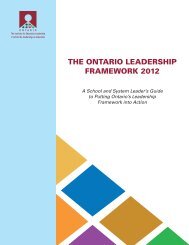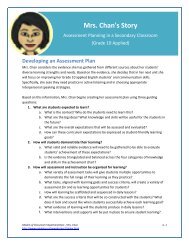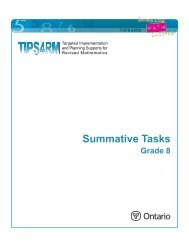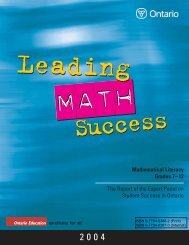Introduction
A Guide to Effective Instruction in Mathematics - eWorkshop
A Guide to Effective Instruction in Mathematics - eWorkshop
Create successful ePaper yourself
Turn your PDF publications into a flip-book with our unique Google optimized e-Paper software.
it wants to handle the assignment of lead teachers, and of any board-level personneldesignated to support math initiatives, in its schools.Experience in other jurisdictions indicates that lead teachers’ difficulties in settlinginto their new role and any misgivings on the part of school staff about the initiativeare minimized when the lead teachers are selected carefully, when they havecredibility with and the trust of their colleagues, and when they receive the supportof administration at both the school and the board levels. The likelihood of success isfurther enhanced when the lead math teacher’s role is developed in consultation withadministrators and staff and when expectations are realistic in relation to availabletime and resources.Lead teachers themselves can contribute to the success of math initiatives by recognizingthat change may be difficult, by encouraging colleagues to take regular but manageablesteps in implementing new strategies in their mathematics instruction, by beingsupportive of colleagues as they attempt new practices, and by celebrating effectivepractices and student successes with them.PRINCIPALS“As instructional leader of your school, you must support the efforts of all teachersto promote students’ mathematical skills. You can help by providing resources andtime for teachers to build their skills, discuss what works, and collaborate in aschool-wide effort to increase the ability of all students to achieve mathematically.”(National Association of Elementary School Principals [NAESP], 2000, p. 87)The role of principals in implementing successful math strategies in their schools isprimarily one of leadership – to establish a focus on math in their school communities.They do this in many ways. As curriculum leaders, they communicate andemphasize fundamental beliefs and understandings about the importance of successin math, as well as board and school goals for improvement in mathematics. Theyalso use their leadership to help align the “success factors” that are partly or entirelywithin their control – time, resources, personnel, practices, and plans – so that theysupport the goals of improvement in students’ achievement in mathematics.Principals can lead whole-school mathematics initiatives bymeans of some or all of the following:• distributing leadership for math initiatives and encouragingthe development of in-school leaders;• developing, in collaboration with staff, clear, measurablegoals for professional learning that are aligned with theschool’s goals for improving the level of studentachievement;“. . . the moral imperative of theprincipal involves leading deepcultural change that mobilizes thepassion and commitment of teachers,parents, and others to improve thelearning of all students, includingclosing the achievement gap.”(Fullan, 2003, p. 41)Achieving and Sustaining Improvement 13

















